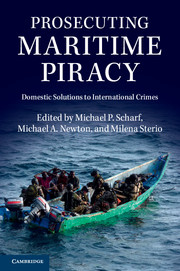Book contents
- Frontmatter
- Contents
- Contributors
- Introduction
- PART I DEFINING THE CRIME OF PIRACY AND ESTABLISHING JURISDICTION OVER THE CRIME OF PIRACY
- 1 The Governing International Law on Maritime Piracy
- 2 The Incorporation of International Law to Define Piracy Crimes, National Laws, and the Definition of Piracy
- 3 Exercising Universal Jurisdiction over Piracy
- 4 Incorporating International Law to Establish Jurisdiction over Piracy Offenses: A Comparative Examination of the Laws of the Netherlands, South Korea, Tanzania, India, and Kenya
- PART II THE PURSUIT, ARREST, AND PRE-TRIAL TREATMENT OF PIRATES
- PART III LEGAL ISSUES IN DOMESTIC PIRATE TRIALS
- PART IV SENTENCING AND POST-SENTENCE TREATMENT OF CONVICTED PIRATES
- Conclusion: Is There a Case for an International Piracy Court?
- Index
4 - Incorporating International Law to Establish Jurisdiction over Piracy Offenses: A Comparative Examination of the Laws of the Netherlands, South Korea, Tanzania, India, and Kenya
from PART I - DEFINING THE CRIME OF PIRACY AND ESTABLISHING JURISDICTION OVER THE CRIME OF PIRACY
Published online by Cambridge University Press: 05 June 2015
- Frontmatter
- Contents
- Contributors
- Introduction
- PART I DEFINING THE CRIME OF PIRACY AND ESTABLISHING JURISDICTION OVER THE CRIME OF PIRACY
- 1 The Governing International Law on Maritime Piracy
- 2 The Incorporation of International Law to Define Piracy Crimes, National Laws, and the Definition of Piracy
- 3 Exercising Universal Jurisdiction over Piracy
- 4 Incorporating International Law to Establish Jurisdiction over Piracy Offenses: A Comparative Examination of the Laws of the Netherlands, South Korea, Tanzania, India, and Kenya
- PART II THE PURSUIT, ARREST, AND PRE-TRIAL TREATMENT OF PIRATES
- PART III LEGAL ISSUES IN DOMESTIC PIRATE TRIALS
- PART IV SENTENCING AND POST-SENTENCE TREATMENT OF CONVICTED PIRATES
- Conclusion: Is There a Case for an International Piracy Court?
- Index
Summary
INTRODUCTION
Because several states have demonstrated a growing willingness to prosecute acts of maritime piracy in their national courts, the incorporation of international law by such prosecuting states into their respective national legislations has become particularly salient. A number of major international treaties provide the possible bases for prosecuting suspected pirates. However, if pirates are to be prosecuted in domestic courts using an international law-provided jurisdiction base, such international law needs to be incorporated into a state's domestic legal system.
Although states take a variety of approaches to incorporating international law, two basic models of incorporation exist. The first model, monism, refers to states that incorporate treaties and conventions directly and automatically into their domestic law. In other words, once ratified, the treaty has binding domestic effect. The second model, dualism, refers to states that require implementing legislation in order for a ratified treaty or convention to have domestic effect. States usually do not fit either pole perfectly: most monist states usually require implementing legislation for some treaty provisions, and dualist states are often willing to rely on ratified but unimplemented treaties as the basis for judicial rulings.
This chapter examines how some of the most important piracy-prosecuting nations, including the Netherlands, South Korea, Tanzania, India, and Kenya, incorporate international law into domestic law. Each of these nations is relevant for the purpose of globally combatting piracy; and each nation's relevance is unique, given that each one has played a different role in such anti-piracy efforts. The Netherlands is an example of a strong maritime nation that has been involved in both patrolling international waters and apprehending suspected pirates, as well as prosecuting some suspects. Kenya and Tanzania are prosecuting nations that have concluded transfer agreements with different patrolling and apprehending nations, and as such, they have been at the forefront of Somali piracy prosecutions. Finally, South Korea and India are nations that have been involved in combatting piracy in a different geographic region (Asia); it is thus interesting to examine how they have handled the challenge of domestic piracy prosecutions.
- Type
- Chapter
- Information
- Prosecuting Maritime PiracyDomestic Solutions to International Crimes, pp. 75 - 100Publisher: Cambridge University PressPrint publication year: 2015
- 1
- Cited by



